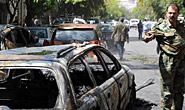
ROME, April 16 (Xinhua) -- The 10-member panel of so-called "wise men" appointed by Italy's president has put forth their proposal to help resolve Italy's seven-week-old political stalemate, but the plan did not have its desired effect.
The three main blocs that emerged from Italy's Feb. 24-25 vote remain as entrenched as ever, while the largest of them, the center-left bloc led by former minister Pier Luigi Bersani appears to be at risk of descending into political infighting.
Meanwhile, the clock is ticking toward the end of the term for President Giorgio Napolitano, who will step down effective May 15. With the compromise government plan from the wise men an apparent failure, it adds a new layer of complications to a situation that already appears nearly unsolvable.
Napolitano appointed the "wise men" panel last month in hopes that they would be able to broach a compromise between the three main parties, which include the center-right alliance led by billionaire media mogul and three-time Prime Minister Silvio Berlusconi, and activist former comedian Beppe Grillo, who leads a populist bloc. The plan was unprecedented, risky, and an illustration of the depth of the problems Italy is facing.
Even from the start, the odds looked long, after Valerio Onida, one of the members of the panel, was tricked into commenting on live radio broadcast that Berlusconi should "leave Italians in peace" and that the panel he was part of was "most likely useless."
Notwithstanding Onida's remarks, the panel last Friday released a package of reforms they said could serve as a basis for a broad platform that could draw support from different points along the political spectrum.
The reforms -- drawn in part from the platforms of the three main coalitions -- included plans to reduce government bureaucracy, make tax collection more efficient, and to spark growth by backing small businesses and support struggling families, while continuing to pay down debt in order to keep bond yields low.
Most importantly, at least in political terms, it called for a new set of electoral rules that would make it easier to reach a solution to the current stalemate.
In theory, there should be something in the package for all the coalitions to support. But so far, that has not been the case. And with no legal force behind the recommendations, it is possible they will have little or no impact. But experts said they could serve as a kind of blueprint for a future governing plan.
As things stand, the chances for compromise between the main parties have never seemed longer. Bersani offered many times to form a coalition government with Grillo's forces, but has been rebuffed so many times that his advisors have apparently stopped exploring that avenue. Meanwhile, Berlusconi's own efforts to strike a deal with Bersani have been refused.
Now, infighting within Bersani's own coalition make made a compromise deal even less likely. Matteo Renzi, who finished second to Bersani in a center-left primary vote last year, Until recently, Renzi had been a strong supporter of Bersani's efforts to form a platform.
But this week that changed when Renzi denounced the party's leadership, bringing his discontent with how events were unfolding out into the open. "Every day we wait is a wasted day for Italy," he said.
Renzi's calls for action have helped erode Bersani's support even in his own party, and have raised the possibility that Renzi could be chosen as an alternative to Bersani as the head of the center-left if the situation breaks down further.
We recommend:

World Pillow Fight Day marked in Washington

Multiple mortar shells hit Damascus

Prince William, Kate love sports

Aurora shines in Estonia

Floods kill 46 in Argentina

The world in photos
















 China's weekly story
China's weekly story
(2013.4.8-4.12)


![]()
